His eyes flitted forward and back, and having surveyed the scene for possible danger, it stopped. The head stooped, and that was how he stayed. Crouched on the floor of a bus full of Bangalis, the Pahari (hill person) amongst us, was living in occupied land. Keeping out of trouble was his best chance for survival.
It was only when the uniformed men with guns boarded the bus and prodded him that he raised his eyes. Scared, tired, hurt, angry eyes. But he knew enough to not express his anger. Meekly he obeyed the commands. His humiliation was also ours, but we did not complain. We were tourists in our own land, but the constitutional guarantees enshrined in our laws, while not fully respected anywhere, was particularly absent here. As well-connected Bangalis, we were far more safe than he was. But the rules of occupation are never generous, and they had guns. They left. We breathed more easily. He continued his journey with his head bowed. I took no photographs.
Walking through Rangamati as Bangali tourists was a disconcerting feeling. Many of the Bangalis here were also poor. Displaced from their homes in far away places, they had been dumped here with promises of a happy life. Left to fend for themselves, they joined the power chain well above the Paharis, but very low down all the same.
At the top of the chain was the military. Then the wealthy Bangalis, the ones who made the deals, then came the Paharis who had sided with the government. The Bangali settlers (the poor ones anyway), were quite a bit further down. The Paharis never dared to reach for the rungs of that ladder.
Rangamati was still a beautiful place. The homes buried beneath the lake when the Kaptai Dam was built, the tropical rain forests that had been destroyed, the hill people who were forced to leave their ancestral land, were things that never made it to our history books. The Hill Tracts featured in the picturesque postcards and tourism ministry books and the well rehearsed cultural programmes in the government Tribal Centre.
Occasional photographers from the lowlands came to discover the ?authentic tribal lifestyle?. A bare chest woman bathing by a waterfall, backlit women with children strapped on their backs, a wrinkled old woman smoking a pipe and other photographic trophies were potential award winners.
As anticipated, the tiktikis (lit: geckos, local term for government spies, generally members of ?Special Branch?) soon found us. They followed us everywhere. Asked stupid questions. Made notes. Questioned the people we had spoken to or visited. We consciously stayed away from friends. No point in getting them into trouble.
At a later visit, Drik?s printer Nasir and I had gone to Bandorban. Amongst the photographs I?d taken on that trip was this one of a mother weaving. Perhaps I was repeating what the trophy hunters had done, but the poster above the window, part of a UNICEF blindness prevention campaign, had words that seemed poignant. ?hai re kopal mondo, chokh thakite ondho?.? (oh what irony we find, we have eyes but are blind.)
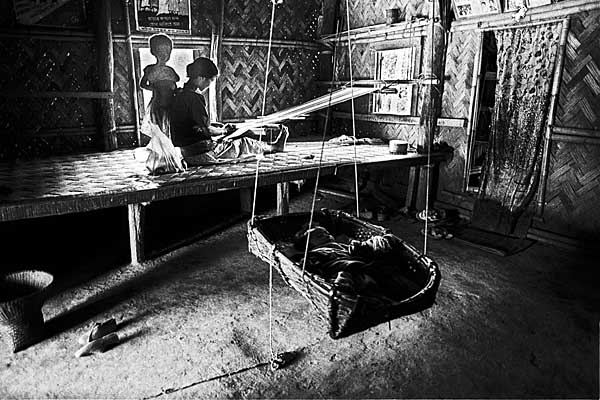
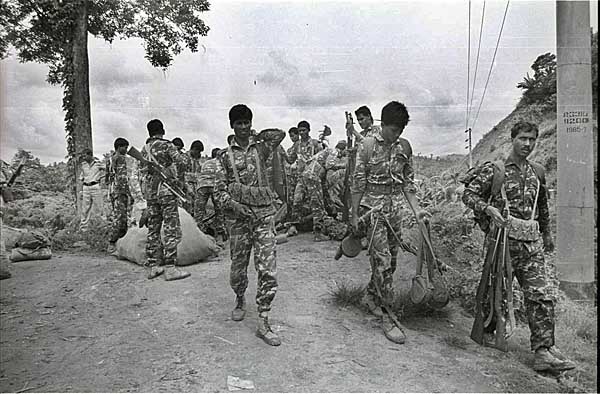
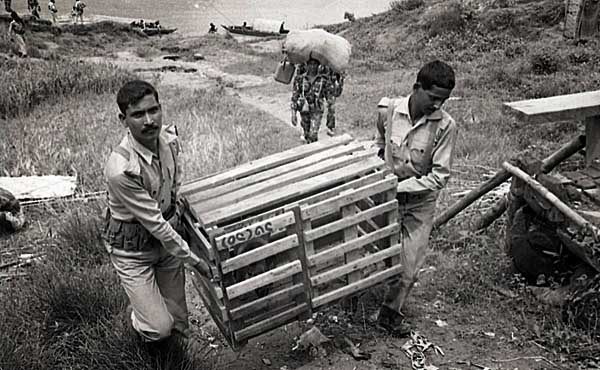
My eyes had shown me the military operations in the hill tracts. The deer being taken to the major?s home. The all Bangali military. The timber being taken to the military camp. While we did see Paharis, carrying loads, and doing odd jobs, most of the shop owners were Bangali settlers. It was Bangalis who had access to the government. They who obtained the local contracts. Menial labour was generally, all that Paharis could aspire to.
Kalpana Chakma?s abduction followed (12th June 1996). Friends got arrested. Some were released, but killed upon release. The violence continued, more murders, more rape, more displacement.
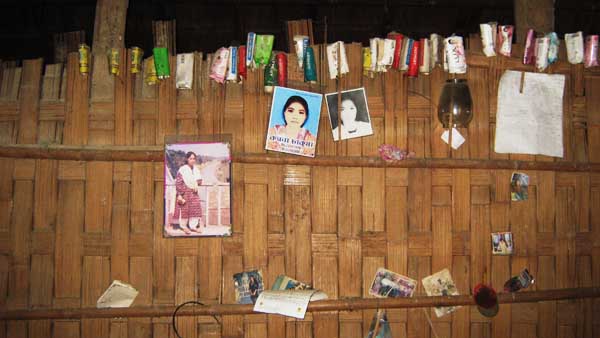
On 2nd December 1997 the newly elected Awami League (1996) signed the ?Peace Treaty? with Jana Samhati Samiti (JSS). This had led to divisions amongst the hill people. Many felt that the core concepts of:
1.??????????? Autonomy for the Chittagong Hill Tracts.
2.??????????? Withdrawal of the Bangali settlers.
3.??????????? Demilitarization of the Chittagong Hill Tracts.
were being compromised. Others were more pragmatic. Even those who questioned the signing of the treaty by JSS, despite their demands not having been met, recognise that peace in CHT is the ultimate goal, and that the land disputes that resulted from the government aided settlement of Bangalis was the core cause of the conflict.
The sole purpose of a nation?s military is to protect the sovereignty of all of its citizens, not to suppress them. The need to protect a nation?s borders cannot justify the forced eviction of people from their ancestral land. The disregard for even the commitments made, exposed the government?s lack of sincerity to the peace deal. Imperfect though it may be, for those clinging to the flimsiest of promises, the treaty still held hope.
The irony of the military and the settlers – in the second term of the Awami League – choosing the month of February, to remind the Paharis of how brutal they could be, was not lost on the survivors of the massacre. Salauddin, Jabbar, Barkat, Rafiq and Salam had died in 1952 to protect our mother tongue. In February 2010 many Pahari names joined the list of people who died for their mother tongue. But these different sounding names would never make it to that official list.
These were names that probably didn?t exist anyway. Without rights to land, citizenship and protection of the state, they were second class citizens at best, fugitives to be hunted, raped and killed at worst.
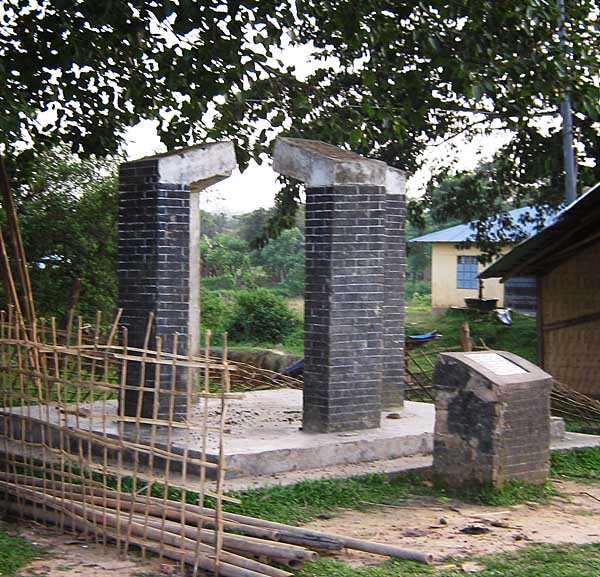
matri bhasha (mother tongue), has a very different meaning when your mother is Pahari. Kalpana,?I failed you as a brother, when they abducted you. I failed you as a friend, when they killed your brothers Mantosh, Samar, Shukesh and Rupan. I fail you now as a citizen, when my military and my government burn your villages, murder your families, take away your land. I fail you all as a human being, when you are prevented from laying flowers at the Shahid Minar in your village home. amar bhaier rokte rangano, ekushey february. ami ki bhulite pari. This month, red with your warm blood. I cannot, will not, must not, ever forget.
Shahidul Alam
Dhaka
28th February 2010
A story in Croatia with similar concerns:
Skip to content
Musings by Shahidul Alam
